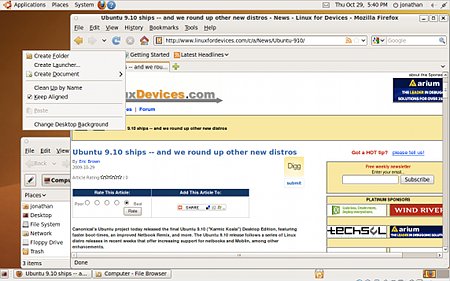Ubuntu 9.10 ships — and we round up other new distros
Oct 29, 2009 — by Eric Brown — from the LinuxDevices Archive — 1 viewsCanonical's Ubuntu project today released the final Ubuntu 9.10 (“Karmic Koala”) Desktop Edition, featuring faster boot-times, an improved Netbook Remix, and more. The Ubuntu 9.10 release follows a series of Linux distro releases in recent weeks that offer increasing support for netbooks and Moblin, among other enhancements.
The Ubuntu 9.10 release (Karmic Koala) caps off a busy season of new Linux distribution releases, as detailed on our sister site, DesktopLinux. Recent releases — ready to go head to head with Microsoft's Windows 7 — include updates to Red Hat Enterprise Linux (RHEL) 5.4, Fedora 12, OpenSUSE 11.2, CentOS 5.4, OpenSUSE 11.2, Mandriva 2010, Puppy Linux 4.3, Sabayon 5.0, and Slackware 13.

Ubuntu 9.10
(Click to enlarge)
The following briefly summarizes in reverse chronological order some of the key Linux distribution announcements over the last two months, with the headlines linking to DesktopLinux articles for more information:
- Ubuntu 9.10 — Since the beta for the Canonical-backed "Karmic Koala" arrived several weeks ago, the reviews have been quite positive for the latest version of the leading desktop Linux distribution. Key features include faster boot-times and improved login and installation processes, as well as enhancements to audio, 3G connectivity, and Intel video drivers. Enterprise-focused features include enhanced support for the new Ubuntu Enterprise Cloud (UEC) and Ubuntu One cloud services, as well as better encryption and AppArmor access control features. Package updates include GNOME 2.28 and Firefox 3.5. Meanwhile, IBM launched an Ubuntu-based cloud distribution called IBM Client for Smart Work for general availability last week, after first introducing it in Africa. (See "Related Stories" at the end of the article for all the recent Ubuntu-related stories on DesktopLinux.)
- CentOS 5.4 — After settling a dispute this summer that threatened to fork the project, this community-based Red Hat clone project released CentOS 5.4 last week. Based on the recently released RHEL 5.4 (see farther below), version 5.4 upgrades 266 packages, adds 27, and implements preview versions of the ext4 file-system and KVM hypervisor.
- Fedora 12 — While CentOS offers clones of the previous RHEL release, the leading-edge Fedora foreshadows improvements in the next Red Hat version. The Fedora Project released the beta version of Fedora 12 "Constantine," a little over a week ago, promising a final version in November. Fedora 12 adds Moblin as part of a new Fedora 12 Moblin Fedora Remix edition. Fedora 12 also offers speed optimizations for i686 and the Intel Atom. Other new features include enhanced IPv6 and Bluetooth support, as well as improved virtualization, multimedia, and power management features. A recent review by our sister site eWEEK praised the beta, noting that it "advances the state of Linux system privilege management on multiple fronts and exhibits continued progress in virtualization."
- Puppy Linux 4.3.1 — Several weeks ago, the Puppy Linux project released a 4.3.1 bugfix upgrade for last month's major 4.3 release. The popular, lightweight GNU/Linux distro has been rebuilt with a new "Woof" build system and PPM package manager, among other features. It also offers a streamlined desktop (pictured at right).
- Mandriva 2010 — Earlier this month, French software firm Mandriva announced the final development release of Mandriva Linux 2010, complete with the full Moblin v2.0 netbook environment. Based on the latest Linux 2.5.31 kernel, Mandriva 2010 RC2 offers a choice of KDE 4.3.2 and GNOME 2.28 desktops, plus Intel Poulsbo chipset drivers, guest accounts, and the Nepomuk collaborative desktop (pictured below)
Mandriva 2010 incorporates the Nepomuk collaborative desktop, which allows KDE users to tag, rate, and comment on files via the KDE file manager, Dolphin. - Sabayon Linux 5.0 — The Italy-based Sabayon community released a stable version 5.0 of its Gentoo-based Linux distribution. Sabayon Linux 5.0 is available in separate editions with either the GNOME 2.26 or KDE 4.3.1 desktops. The distribution offers Linux kernel 2.6.31, XBMC 9.04.1, and the ext4 filesystem. The 5.0 version is touted as being "dedicated to those who like cutting edge stability, out of the box experience, outstanding desktop performance, clean and beauty."
- OpenSUSE 11.2 — A month ago, the Novell-sponsored OpenSUSE project, which has a somewhat similar relationship to SUSE Linux as Fedora has to RHEL, released the last milestone of OpenSUSE Linux before an anticipated final release in November. OpenSUSE 11.2 Milestone 8 (M8) features numerous bug fixes, Linux kernel 2.6.31, improved partitioning, social networking clients, and new versions of packages including GNOME 2.28 (pictured below). Meanwhile, OpenSUSE.org has released a Moblin v2.0 version of OpenSUSE. Informally called "Goblin 1Click," the netbook-oriented release is currently available in an image based on OpenSUSE 11.1.
GNOME 2.28 desktop in OpenSuSE 11.2 - Slackware 13 — We covered a beta release of Slackware 13 two months ago, but the venerable Linux distribution has recently been released in final form. Version 13 now supports 64-bit computers, and offers "completely reworked" X packages. Other enhancements include upgrades to KDE 4.2.4 and Xfce 4.6.1 desktops, a new .txz package format, and support for ext4 and the GRUB bootloader.
- Red Hat Enterprise Linux 5.4 — Red Hat has been one of the most profitable companies in IT over the last year, as recession-strapped companies increasingly turn to more affordable open source solutions. Released the last week of August, RHEL 5.4 hopes to keep the party hopping. The leading enterprise focused Linux distro added full support for the KVM (Kernel-based Virtual Machine) hypervisor, as well as cluster improvements, new graphics drivers, laptop docking support, ALSA audio infrastructure, and improved Fibre Channel over Ethernet (FCoE) enablement, security, and tools enhancements.
Availability
Ubuntu 9.10 Desktop Edition final is available free of charge, here.
This article was originally published on LinuxDevices.com and has been donated to the open source community by QuinStreet Inc. Please visit LinuxToday.com for up-to-date news and articles about Linux and open source.